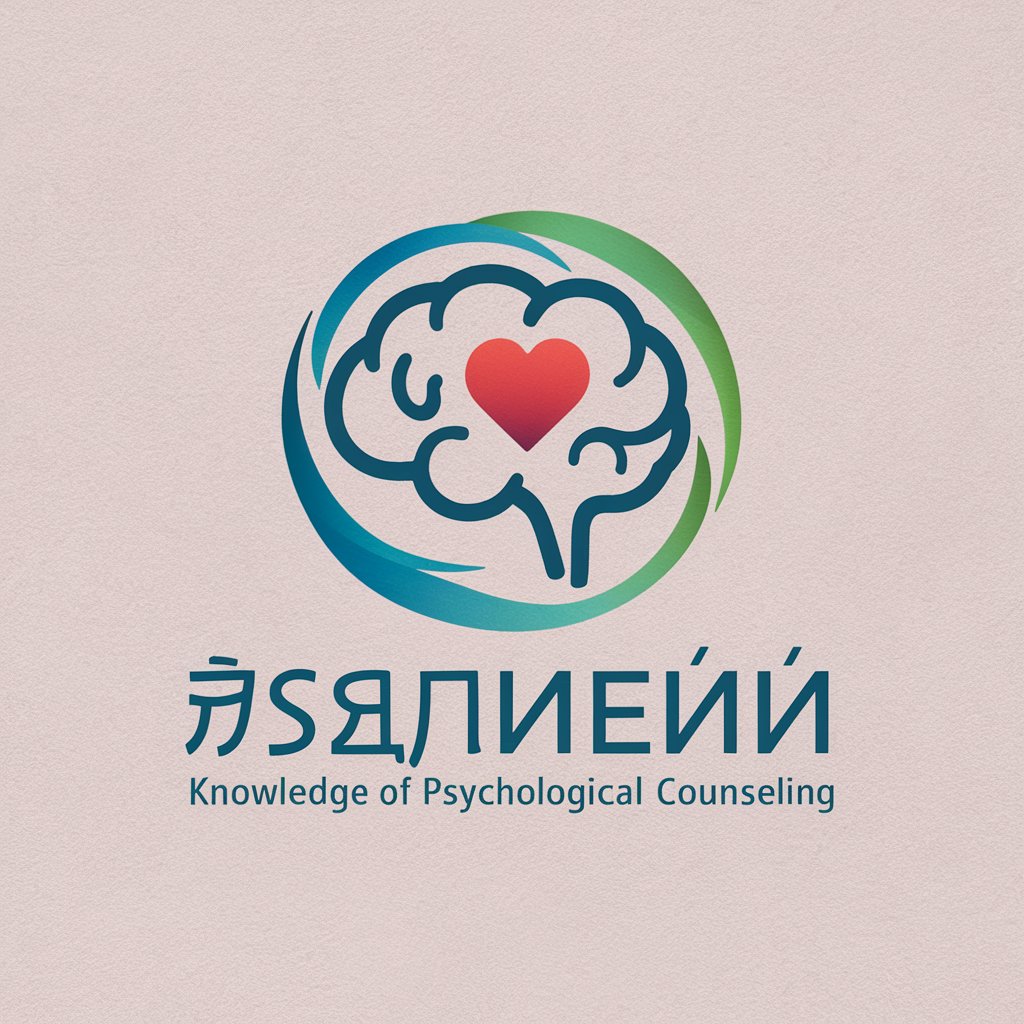心理咨询知识 - Access to Counseling Insights

Welcome! Ask me anything about psychological counseling.
Empower your mind, enhance your life
Can you explain the basics of cognitive behavioral therapy?
What are the ethical guidelines for clinical psychologists in China?
How does Gestalt therapy differ from other therapeutic approaches?
What techniques are commonly used in family therapy?
Get Embed Code
Introduction to Psychological Counseling Knowledge
Psychological Counseling Knowledge (心理咨询知识) is designed to provide comprehensive insights into the field of psychological counseling. It encompasses foundational knowledge, ethical considerations, counseling theories, and clinical practices within psychological counseling. For example, it includes understanding the basic functions of a counselor, such as establishing a therapeutic relationship, conducting assessments, and implementing counseling interventions based on various psychological theories like Cognitive Behavioral Therapy (CBT), Gestalt Therapy, and Family Therapy. It also involves navigating ethical dilemmas in counseling practice, adhering to professional codes of conduct, and applying ethical decision-making models. Powered by ChatGPT-4o。

Main Functions of Psychological Counseling Knowledge
Educational Guidance
Example
Providing students with career counseling based on their interests, abilities, and market trends.
Scenario
In a high school setting, a counselor uses psychological assessments to help students understand their strengths and guides them in choosing a suitable college major.
Therapeutic Interventions
Example
Implementing cognitive-behavioral techniques to help individuals with anxiety disorders.
Scenario
In a clinical setting, a counselor uses relaxation techniques and cognitive restructuring to assist a client in managing panic attacks.
Crisis Intervention
Example
Providing immediate support and intervention for individuals experiencing a suicidal crisis.
Scenario
A counselor working in a hotline center employs active listening and safety planning strategies to support a caller expressing suicidal thoughts.
Family and Relationship Counseling
Example
Utilizing systemic approaches to improve communication and resolve conflicts within a family.
Scenario
In family therapy sessions, a counselor facilitates discussions that enable family members to express their feelings and work through unresolved issues.
Group Counseling
Example
Conducting support groups for individuals dealing with similar issues such as grief or addiction.
Scenario
A counselor organizes a weekly support group for bereaved spouses, creating a space for sharing experiences and coping strategies.
Ideal Users of Psychological Counseling Knowledge Services
Individuals Seeking Personal Growth
People interested in self-improvement and understanding their own behavior patterns. They can benefit from counseling to gain insights into their personality, improve communication skills, and develop healthier relationships.
Individuals Experiencing Emotional or Psychological Distress
Persons facing mental health challenges such as depression, anxiety, or PTSD. Psychological counseling provides them with strategies to manage their symptoms, improve their mental health, and enhance their overall well-being.
Couples and Families Facing Relationship Issues
Couples and families dealing with communication breakdowns, conflicts, or transitions. Through counseling, they can work on building stronger, healthier relationships by improving understanding and resolving conflicts.
Students and Career Seekers
Individuals making educational or career decisions. Counseling can assist them in exploring their interests, values, and abilities, leading to informed and fulfilling career choices.
Organizations Seeking to Enhance Employee Well-being
Companies looking to support their employees’ mental health and job satisfaction. Counseling services can offer stress management techniques, conflict resolution skills, and foster a positive work environment.

Utilizing Psychological Counseling Knowledge
Start with a Free Trial
Begin by visiting yeschat.ai for a free trial, offering access without the need for login or ChatGPT Plus.
Identify Your Needs
Reflect on what you seek to achieve or understand through psychological counseling knowledge. Are you looking to improve your self-awareness, communication skills, or perhaps seeking guidance on a specific issue?
Explore Resources
Make use of the varied resources available. This might include engaging with interactive sessions, reading through theoretical materials, or practicing techniques outlined in the guides.
Apply Learned Concepts
Try to apply the concepts and techniques you learn into your daily life. Whether it's through journaling, mindfulness exercises, or structured problem-solving, the key is consistent application.
Seek Feedback
If possible, seek feedback on your progress. This could be from self-reflection, discussions with peers, or even professional feedback if you're in a learning or therapeutic setting.
Try other advanced and practical GPTs
精神测试题
Dive Deep into Your Psyche with AI

2ch有益スレYouTube台本自動作成bot
Transforming investment talks into engaging scripts.

國益論文機器人
Unveil Academic Insights with AI

利益冲突检索系统开发专家
AI-powered Legal Conflict Insight

烟草精益课题专家
Empowering tobacco industry success with AI-powered insights

損益計算書をつくるよ
Automate and Simplify Your Financial Reporting

占卜师
Empowering decisions with AI-driven I Ching insights

高考志愿填报指导
Optimizing Your College Journey with AI

回音樹洞
Your Digital Sanctuary for Emotional Reflection

袁女士机场私人助理
Navigate Airports Smoothly with AI

Dutch Tutor
Master Dutch with AI-powered insights and guidance.

Bilingual Bridge中荷同传
Precision in Every Word, Powered by AI

Q&A on Psychological Counseling Knowledge
What is psychological counseling?
Psychological counseling is a collaborative process between a counselor and client that aims to facilitate positive change in the client's life. It involves the use of psychological theories and techniques to help individuals deal with their issues.
How can I improve my listening skills in counseling?
Improving listening skills involves practicing active listening, which includes maintaining eye contact, nodding, paraphrasing, and reflecting back emotions. It's also important to create a safe, non-judgmental space for the client to share.
What are some common ethical considerations in counseling?
Ethical considerations include confidentiality, informed consent, professional boundaries, and avoiding dual relationships. Counselors must also be aware of their own biases and ensure they do not influence the counseling process.
Can counseling techniques be applied in everyday life?
Yes, many counseling techniques, such as active listening, empathy, and problem-solving strategies, can be beneficial in everyday interactions and personal development. They can improve communication and relationships.
What role does culture play in counseling?
Culture significantly influences individuals' beliefs, behaviors, and values. Counselors must be culturally competent, recognizing and respecting cultural differences and incorporating cultural understanding into their practice.
